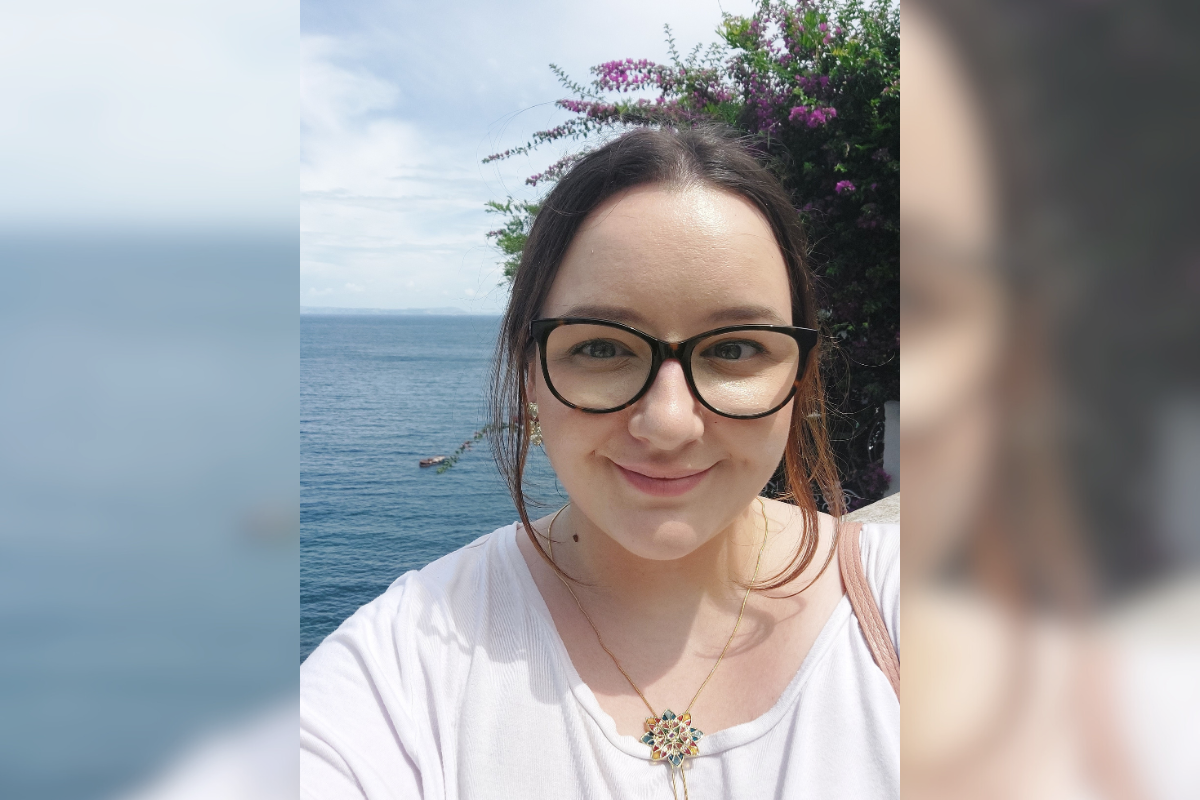Dr Sarah Kelleher shares her passion for guiding dissertation projects, her favourite lecture on victim-survivors’ experiences, and the reasons behind choosing Kent as her academic home. Uncover her love for immersive fantasy literature, music-filled commutes, and valuable advice for thriving in university studies.
“There’s no one-size-fits-all for studying so take the time to figure out what works best for you.”
What’s your favourite part about teaching/ interacting with students?
My favourite part about my job is supervising undergraduate and postgraduate dissertation projects. Supporting students to develop their ideas into a project that they’re passionate and excited about is really important whether that’s simply adding in a new question or trying a new methodology. I’ve always enjoyed going through the data together and watching as students become independent researchers interpreting and finding meaning from what we have found.
What’s your favourite lecture and why?
One of my favourite lectures is on victim-survivors’ experiences of the criminal justice system. There’s been a lot of attention on the topic recently in the media, in policy recommendations and in the research literature so there’s a lot of content and discourse which we can critically evaluate. In the lecture I include an interactive element for students to consider and reflect on their own expectations of “real victims” and how victims may respond during the assault, the investigation and at trial. Students engage really well, and I usually get a few students speaking to me during the break or afterwards wanting to know more which brings me joy too!
Why did you choose Kent?
I came to Kent to do my PhD – I knew Kent had an excellent reputation for research and a great team in Forensic Psychology. Getting to join that team as a lecturer has been a pleasure and I think it says a lot that so many staff members in psychology have done one or even all of their degrees at Kent and chosen to stay here. We have a really good community here, a fantastic library, lots of options for places to eat, hang out and study, and the lawn is often covered in baby bunnies or squirrels.
What’s your favourite book at the moment?
At the moment, it’s a coin toss between The Priory of the Orange Tree by Samantha Shannon and The Book that Wouldn’t Burn by Mark Lawrence. Both multiple perspective stories set in detailed fantasy worlds, with strong female characters and mystery. It wasn’t long before I couldn’t put them down… and then proceeded to buy even more books by those authors. For a more forensic psych recommendation, The Devil You Know by Dr Gwen Adshead is a really compassionate and fascinating insight into the challenges (and positives) of working with people who have committed severe offences.
What do you listen to on your commute?
I’ve never really gotten into podcasts despite everyone and their dad now having one. I prefer to listen to music – typically playing one song (or an album) on loop until I can’t listen to it anymore. The last three songs I’ve gotten stuck on are Good Luck Babe! by Chappell Roan, Airhead by Honey Revenge and End of Beginning by Djo.
What are your tips for staying on top of your studies at university?
There’s no one-size-fits-all for studying so take the time to figure out what works best for you. I was the student who barely left the library for the three days before a deadline, surviving on caffeinated drinks and whatever snack I had forgotten in the bottom of my bag – not ideal for one deadline, but definitely not recommended as a sustainable habit! What actually helped me was:
- Working in a group – you don’t need to be studying the same thing but being surrounded by focused people who you can take breaks with is a massive help
- Doing the prep work early – preparing an essay takes much longer than actually writing it and similarly, if you attend your lectures and keep on top of your notes and readings, revising is much easier
- Pomodoro – it is simple but really effective. Make your to-do list first and focus on the top priorities. If all you have is 25 minutes, do what you can as it’s still better than nothing and when you have more time, take one task at a time in 25-minute chunks followed by a 5 minute break. After four pomodoro, take a 30 minute break, ideally away from the screen or your notes.
- It’s hard to stay on top of everything if you are run down and exhausted so don’t neglect looking after physical and mental health.
What advice would you give to first-year Sarah when you first started University?
Dive in and challenge yourself. There’s never an easier time to try new subjects, new activities and make new friends. Take a wild module to learn about something different, try art or dance or whatever sounds intriguing to you. Build experiences like you are building the rest of your CV, even if you don’t know what you want to do next. Being on a committee for a club or society or volunteering to help others will never be a waste of time. Of course, the knowledge you gain from your education is important, but the skills are equally important.

